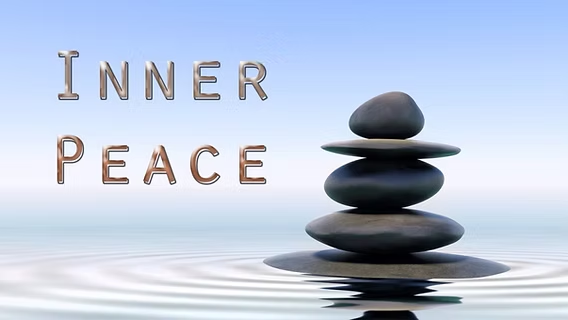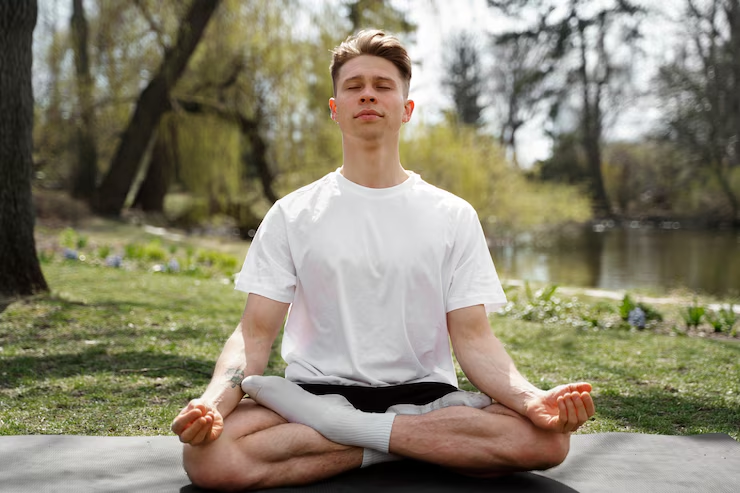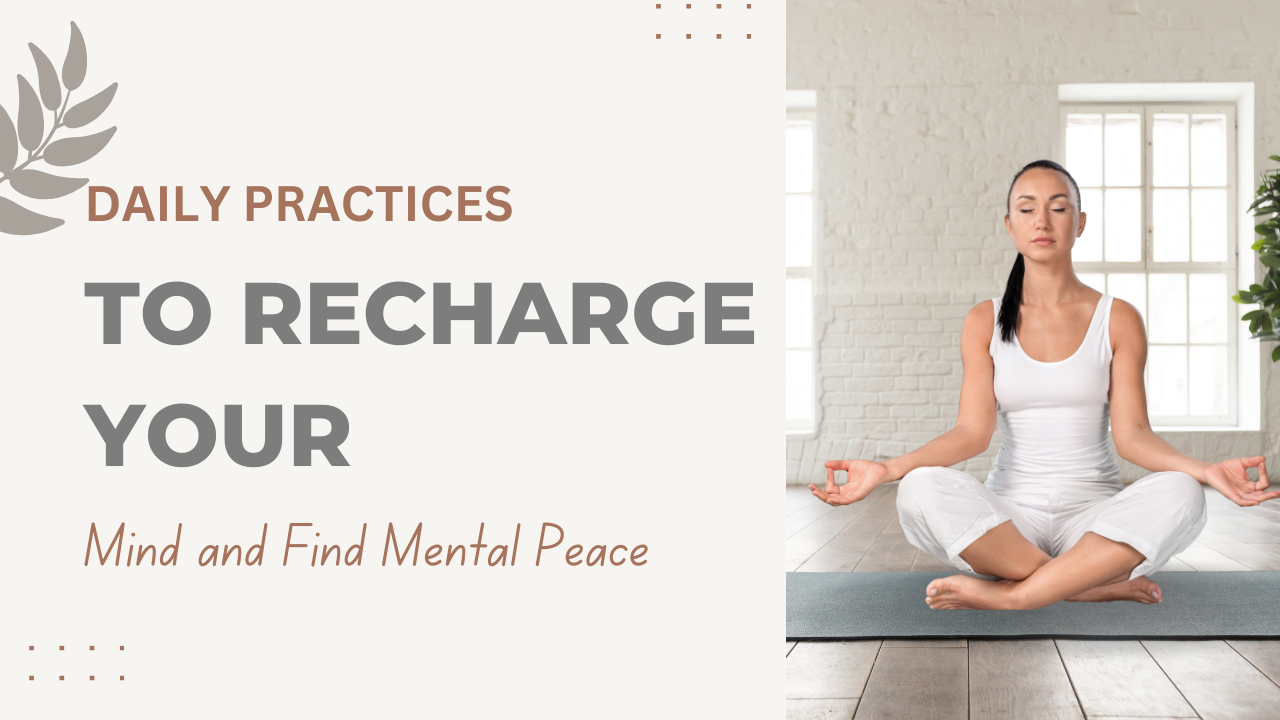In today’s fast-moving world, stress and anxiety have become common experiences. We often find ourselves juggling work, family duties, and social commitments, leaving little time to relax or focus on our mental well-being. As a result, mental peace can feel far away—something we wish for but rarely enjoy. However, inner peace is not a luxury. It’s an important part of living a healthy, happy life. Without it, we may feel constantly tired, anxious, or out of balance.
The good news is that achieving mental peace is possible with small, daily changes. Simple habits like spending quiet time alone, practicing mindfulness, or taking deep breaths can help calm the mind and ease stress. These actions help us slow down, recharge, and feel more connected to ourselves. In this article, we will explore what mental peace really means, why it matters, and offer easy strategies you can use every day to find calm and clarity in your life.
Understanding Mental Peace

What is Mental Peace ?
Mental peace, also known as inner peace or emotional calm, is a state where the mind feels settled, balanced, and free from constant stress or negative thoughts. It means being able to stay calm, focused, and emotionally steady, even when life throws challenges your way. When you have mental peace, you’re not easily shaken by external events. Instead, you’re able to think clearly, make thoughtful choices, and handle problems with patience and control. This calm mindset helps you avoid overreacting or feeling overwhelmed, even in stressful situations.
Having mental peace doesn’t mean you stop having emotions or thoughts. Rather, it means you learn how to manage them in a healthy way. You don’t let worries or anger take over your mind. Instead, you feel a deep sense of calm, contentment, and acceptance. You’re present in the moment and at ease with yourself and your life. Mental peace allows you to move through life with clarity, confidence, and emotional strength.
The Science Behind Mental Peace
Mental peace is not just a vague or abstract idea—it has a real impact on our brain and body. Research in psychology and neuroscience has shown that activities like meditation, mindfulness, deep breathing, and other stress-reducing practices can bring noticeable changes in how our brain works. These practices help calm the mind, allowing the brain to release important chemicals such as serotonin and dopamine. These neurotransmitters are directly linked to feelings of happiness, calm, and emotional well-being.
In addition to boosting positive brain chemicals, mental peace also helps reduce the production of cortisol, which is known as the stress hormone. High cortisol levels can lead to anxiety, sleep problems, and health issues over time. When we are mentally at peace, our autonomic nervous system—responsible for the body’s automatic responses like heart rate and breathing—shifts into a relaxed state. This means we are better able to manage stress, stay emotionally balanced, and enjoy a greater sense of health and calm each day.
Common Misconceptions About Mental Peace
A common misunderstanding about mental peace is the belief that it means living a life free from problems or negative emotions. But that’s not true. Mental peace doesn’t mean avoiding challenges—it means building the inner strength to face them calmly. It’s about staying steady and keeping a positive outlook, even when life feels tough or unpredictable.
Another false idea is that mental peace is something you achieve once and keep forever. In reality, it’s a continuous process that takes daily effort and care. Mental peace isn’t a final goal you reach; it’s a journey you commit to each day by making mindful choices and practicing calmness regularly.
Importance of Mental Peace
- Connection Between Mental Peace and Overall Well-Being
The condition of our mind greatly affects our physical health, relationships, and overall quality of life. When we experience mental peace, stress levels drop, our immune system works better, and we feel less tired and worn out. Inner peace also helps improve our emotional health, lowering the risk of anxiety, depression, and other mental health issues.

By developing mental peace, we build greater resilience to deal with life’s challenges. We’re able to face problems with a calm mind, make wiser decisions, and stay balanced even during tough times. This steady mindset helps us respond to situations more clearly and with greater emotional control.
- Effects of Mental Unrest on Physical Health
On the other hand, when our mind is troubled, it can seriously affect our physical health. Ongoing stress, anxiety, and negative thoughts can lead to health problems like high blood pressure, heart issues, stomach troubles, and even autoimmune conditions. The link between the mind and body is very strong—when the mind is unsettled, the body often suffers too.
Mental stress also affects our sleep. It can cause trouble falling asleep or lead to broken sleep, which over time, harms both our body and emotions. Poor sleep adds to fatigue, weakens our focus, and increases the risk of other health issues.
- How Mental Peace Affects Relationships and Productivity
Mental peace is important not just for our personal health but also for our relationships and work life. When we feel calm and balanced, we communicate better, listen with care, and respond with patience. This helps build stronger and more peaceful connections with family, friends, coworkers, and loved ones.
In the workplace, mental peace boosts focus, creativity, and the ability to solve problems. It helps us stay organized and work more efficiently, while also lowering the risk of stress and burnout. A calm mind leads to better performance and healthier work habits.
Recharge Your Mind: Daily Practices for Inner Peace
Achieving mental peace takes daily effort. It doesn’t happen all at once but grows through small, steady actions over time. Simple habits like mindfulness, deep breathing, or quiet reflection can help. With consistency and patience, we can slowly build a more peaceful, calm, and balanced state of mind each day. Here are some powerful daily practices that can help recharge your mind and cultivate inner peace:
- Mindfulness and Meditation

Mindfulness is the practice of being fully present in the moment, without judgment or distraction. It involves paying attention to what’s happening right now, rather than getting caught up in past regrets or future worries. By practicing mindfulness, we train our minds to focus on the present, which reduces stress and helps us feel more in control of our thoughts and emotions. Meditation is one of the most effective ways to achieve mindfulness. Through regular meditation, we can quiet the constant chatter of the mind, clear away distractions, and find emotional balance.
A simple daily meditation practice, even as short as 10-15 minutes, can have a significant impact on our mental peace. During this time, you can focus on your breath, repeat a calming mantra, or engage in loving-kindness meditation, which encourages compassion and kindness towards yourself and others. By setting aside time each day for meditation, we allow ourselves the opportunity to slow down, clear our minds, and develop a deeper sense of inner calm. Over time, this consistent practice can help us build a peaceful mindset that lasts throughout the day.
- Breathing Exercises
Breathing exercises are another powerful method for calming the mind and reducing stress. When we practice deep, slow breathing, it activates the parasympathetic nervous system, which is responsible for promoting relaxation and restoring balance in the body. This helps counteract the effects of stress, calming both the mind and body. One simple but effective breathing exercise is the 4-7-8 technique. This method involves inhaling slowly for 4 seconds, holding the breath for 7 seconds, and then exhaling slowly for 8 seconds. By repeating this cycle for a few rounds, you can immediately reduce feelings of anxiety, lower your heart rate, and shift your body into a more relaxed state.
Breathing exercises like this are easy to do anywhere and can be particularly useful in moments of stress or tension. They allow you to take a quick mental break, reset your thoughts, and refocus. With regular practice, deep breathing can become a natural way to handle stressful situations, helping to foster a greater sense of inner calm and emotional balance.

- Physical Activity
Exercise is not only important for physical health but is also a powerful tool for enhancing mental peace and emotional well-being. Activities like yoga, walking, running, or swimming help release built-up tension in the body, improve mood, and reduce stress. When we engage in physical activity, our body produces endorphins, which are chemicals in the brain that promote happiness and a sense of calm. These endorphins play a significant role in improving our mood and boosting mental clarity, helping us to feel more balanced and at ease.
Even a simple 20-minute walk outside can have a remarkable effect on your mood and overall mental health. It gives you a break from daily pressures, allows you to clear your mind, and provides fresh air and movement. Regular physical activity doesn’t have to be intense; even moderate exercise can be incredibly beneficial for your mind. By incorporating exercise into your daily routine, whether through a walk, yoga session, or any other form of movement, you can help maintain mental peace, reduce stress, and improve your emotional resilience over time.
- Creating a Positive Environment
The environment around us has a profound effect on our mental well-being. When we are surrounded by clutter, noise, and chaos, it can lead to feelings of overwhelm, stress, and anxiety. On the other hand, a calm, organized, and peaceful space can promote a sense of clarity and tranquility. The state of our surroundings directly influences how we feel and think, which is why it’s important to take time to create a peaceful environment that supports mental peace.
Making small changes to your environment each day can have a big impact on your mental state. Start by decluttering your workspace or living area to reduce distractions and create a more organized setting. Adding elements like plants, calming colors, or soft lighting can also help create a soothing atmosphere. If possible, spending time in nature—whether it’s a walk in the park or simply sitting outside—can provide a refreshing break and allow you to reconnect with a peaceful environment. By intentionally shaping your surroundings to support tranquility, you can foster a more peaceful mindset, improve focus, and reduce feelings of anxiety or stress.
- Journaling and Self-Reflection

Journaling is an incredibly effective tool for releasing pent-up emotions, organizing your thoughts, and reflecting on your daily experiences. Writing down your feelings, concerns, and ideas can help you process emotions that might otherwise remain bottled up, providing you with a sense of clarity and understanding. It’s also a great way to track your personal growth and identify patterns in your thinking. Additionally, journaling allows you to express gratitude, which has been proven to enhance happiness, boost mental well-being, and foster a positive outlook on life.
Taking just a few minutes each day to journal or engage in self-reflection gives you the opportunity to pause and check in with yourself. This practice encourages mindfulness, helps you stay grounded, and allows you to address any feelings of stress or anxiety in a healthy way. Whether it’s writing about your daily experiences, reflecting on your emotions, or simply jotting down things you’re grateful for, regular journaling helps maintain emotional balance and supports overall mental peace. By making it a part of your routine, you create a valuable space for introspection and personal growth.
- Time Management and Setting Boundaries
One of the main contributors to mental unrest is feeling overwhelmed by too many responsibilities and commitments. When we try to juggle everything at once, it can lead to stress, burnout, and a sense of being out of control. To maintain mental peace, practicing effective time management and setting clear boundaries is essential. By learning to prioritize tasks based on urgency and importance, we can focus on what truly matters and avoid unnecessary distractions. Delegating responsibilities when possible can also lighten your load and allow you to concentrate on the most important aspects of your life.
In addition to managing tasks, it’s equally important to make time for rest and relaxation. Taking breaks throughout the day and scheduling downtime can help recharge your mind and body. Learning to say no is also a powerful tool for maintaining mental peace. It’s essential to recognize your limits and set healthy boundaries with others. By protecting your time and energy, you prevent overcommitting and ensure that you have the mental space to focus on what truly brings you peace and fulfillment. Creating a balance between work, responsibilities, and personal time will help you maintain emotional well-being and resilience.
- Disconnecting from Technology

In today’s digital age, we are constantly connected to our devices, and this constant engagement with technology can easily lead to mental overload. The constant influx of information, notifications, and social media updates can create a sense of urgency and stress, making it difficult to unwind and find peace. Taking regular breaks from technology is essential for recharging your mind and reducing the pressure that comes with being always online. Disconnecting from screens, especially social media, allows you to step back, clear your mind, and regain focus.
To protect your mental well-being, it’s important to set aside time each day to disconnect from your devices. This time can be used for activities that nourish your soul and promote relaxation. Whether it’s reading a book, enjoying a hobby, cooking a meal, or spending quality time with loved ones, engaging in activities that don’t involve screens helps restore a sense of balance and mental clarity. By creating daily moments of digital detox, you give your mind the chance to reset and recharge, ultimately reducing stress and promoting a greater sense of inner peace. Taking these breaks is an essential part of maintaining mental health in our constantly connected world.
Conclusion
Mental peace is the foundation of a balanced and fulfilling life. It allows us to manage stress more effectively, make thoughtful decisions, and approach life with greater clarity and joy. When our minds are at peace, we can better handle challenges and stay centered in the midst of chaos. Achieving mental peace doesn’t happen overnight, but by practicing simple, daily habits, we can gradually cultivate a calm and focused mind.
Incorporating practices like mindfulness, regular physical activity, and self-reflection into our daily routines can significantly enhance our mental well-being. Mindfulness helps us stay present, while physical activity releases endorphins that improve mood and reduce stress. Self-reflection, whether through journaling or meditation, provides an opportunity to process emotions and gain clarity. These practices, when done consistently, help recharge the mind and create a sense of inner peace.
It’s important to remember that mental peace is not a destination but an ongoing journey. Small, consistent efforts every day, such as prioritizing rest, setting boundaries, and taking time for self-care, can lead to lasting changes in our emotional and mental health. By integrating these tools into our lives, we can cultivate the peace and balance we deserve, and experience greater happiness and well-being.
FAQs
- What is mental peace and why is it important ?
Mental peace is a state of calm and emotional balance, crucial for overall well-being. It helps reduce stress and supports better health, relationships, and productivity. - Can I achieve mental peace if I have a busy life ?
Yes, by practicing small, consistent habits like mindfulness, meditation, and breathing exercises, you can find peace even in a hectic routine. - How long will it take to experience mental peace ?
The journey to mental peace varies, but consistent practices will lead to noticeable improvements in a few weeks, with long-term peace developing over time. - What daily practices can help recharge my mind ?
Simple practices like mindfulness, meditation, breathing exercises, journaling, and regular physical activity can effectively recharge your mind. - How do I stay consistent with these practices ?
Make peace a daily priority by starting small, setting reminders, and integrating practices into your routine. Over time, these habits will become second nature.

